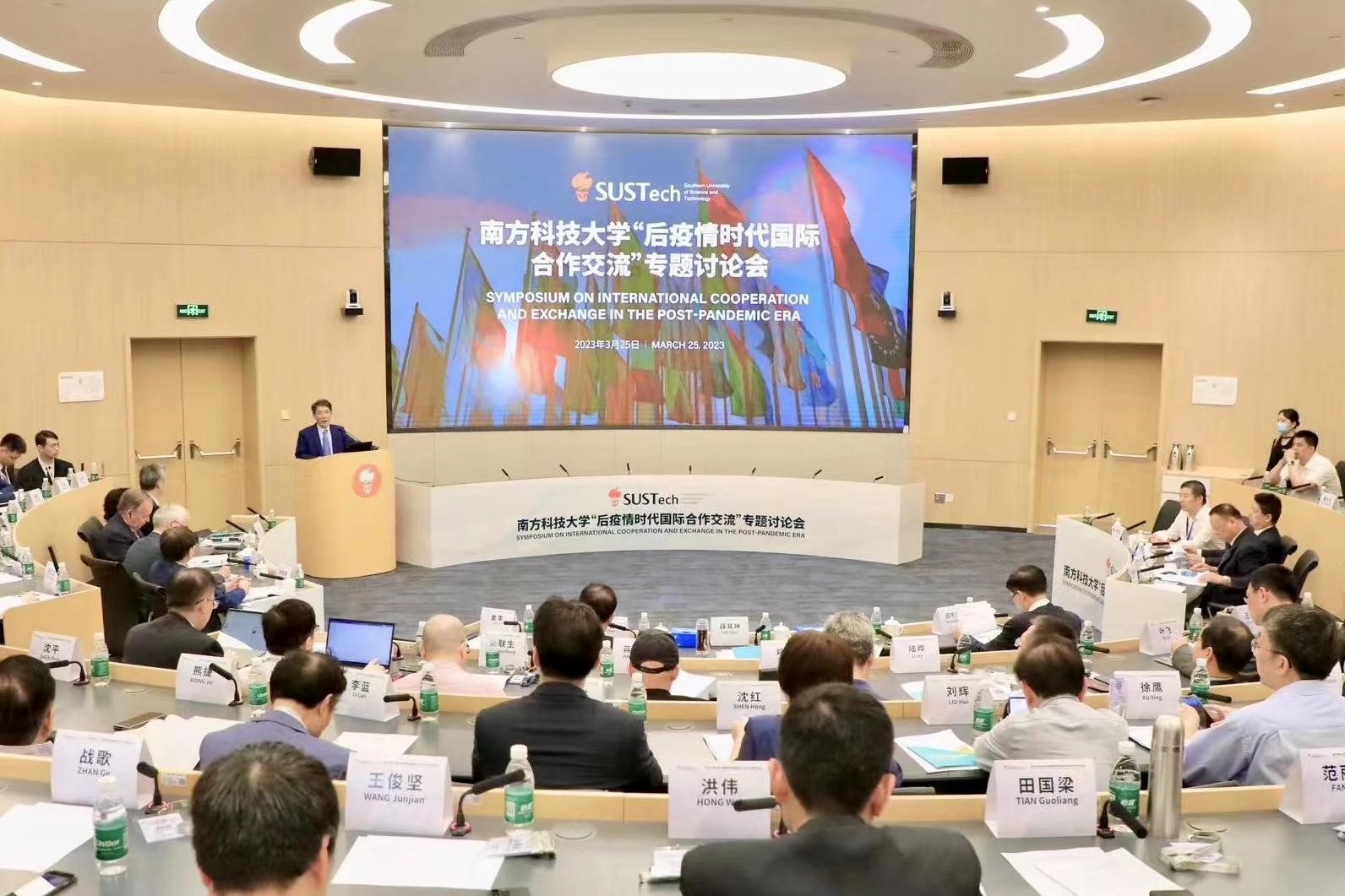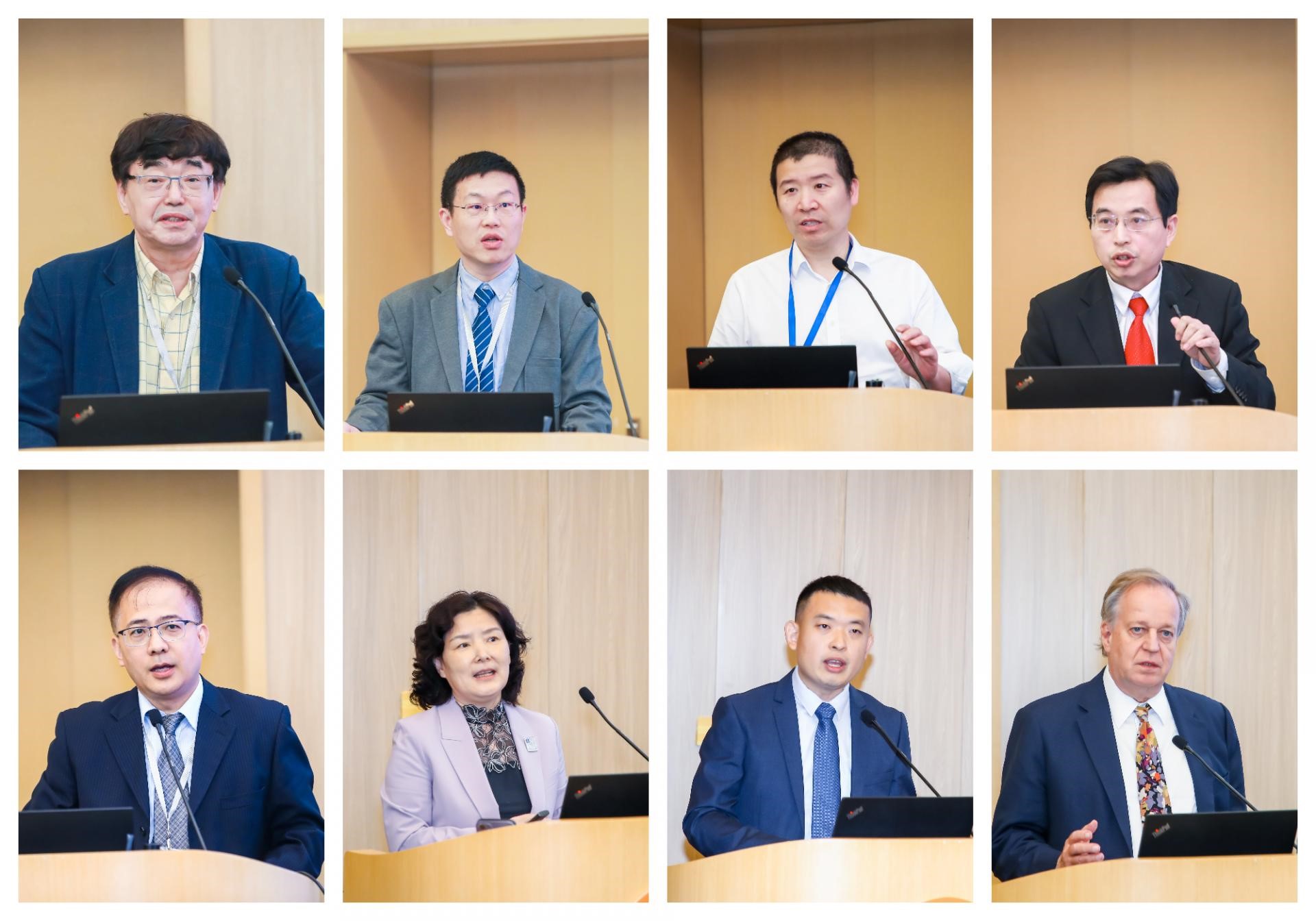On March 25, the Southern University of Science and Technology (SUSTech) held a Symposium on International Cooperation and Exchange in the Post-Pandemic Era.
The event brought together university leaders, faculty members, administrative units, foreign faculty representatives, and student counselor representatives to discuss topics related to internationalization and cooperation of SUSTech.

Facilitated by Li JIN, Vice President and Acting Dean of SUSTech Business School, the symposium covered a range of topics related to international cooperation and exchange in the post-pandemic world, including developing a global vision for undergraduate and graduate students, international faculty development, international cooperation and exchange on research, promoting internationalization in collaboration with international organizations, university governance on internationalization, and building a campus with an international eco-system.
Each topic was introduced by one or two presenters, commented on by a designated guest, and then the symposium concluded with a discussion session.
The event kicked off with an opening speech by Qikun XUE, President of SUSTech. He outlined the significant achievements SUSTech has made over the past few years, paying tribute to the hard work of all SUSTech faculty and staff.
He said that despite the massive impact of the pandemic, SUSTech’s internationalization had not severely reversed. Over the past decade, the University has built a high-level global partnership network, maintained high-quality international research cooperation, established a highly internationalized faculty, and formed a framework for international talent cultivation.
The easing of the pandemic control policies and the resumption of international travel provides new opportunities for the University’s global development. SUSTech should maintain a far-sighted vision, stick to its positioning of building a world-class research university, and seek a pragmatic and innovative path of internationalization.
President XUE then identified the external constraints and internal challenges SUSTech faces and welcomed comments and solutions from participants in attendance. He shared his thoughts on the future of the University’s international cooperation and exchange in the post-pandemic era.
He noted that SUSTech should align with China’s national strategy of opening up, leveraging the advantage of its location in Shenzhen and the Guangdong-Hong Kong-Macao Greater Bay Area (GBA), the most outward-looking economic region of the country and an important window of opening up to the world, and share the story of China and SUSTech.
President XUE believes that the University should find its own positioning and form an internationalized governance model in line with its own reality to further enhance its international capacity and global reputation. He also emphasized the importance of building an international campus, enhancing the satisfaction, integration, and sense of belonging of overseas students and faculty.
“All faculty members and staff should take actions to create an internationalized campus environment, starting with changing the little things around them,” President XUE added.
Zhenghe XU, Dean of the College of Engineering, spoke on developing global competence for undergraduate students. He suggested that the University improve the quality of international education by providing students with more overseas exchange opportunities, offering more courses instructed in English, strengthening the introduction of experienced faculty, and promoting English-language proficiency among faculty and staff.
Fei YE, Associate Dean of the Graduate School, spoke on developing global competence for graduate students. He said that the Graduate School would deeply participate in international high-end academic and research cooperation through establishing the SUSTech Fellowship program for visiting doctoral students from abroad, recruiting international students from top universities, and promoting collaboration and exchange in research projects and student mobility.
Dongfeng GU, Acting Vice President and Dean of the SUSTech-KCL School of Medicine, commented on this topic. He stressed the need to strengthen partnerships with top universities, seek resource support for high-quality projects, and expand the areas of disciplinary cooperation.
Qingsong LIU, Director of the Office of Human Resources, spoke on international faculty development and the introduction of high-level overseas talents. He analyzed the nuances of international faculty building and the factors affecting the transnational flow of global high-end talents.
Prof. Jiping ZHANG, Member of the Presidential Executive Council and Executive Director of the Shenzhen International Center for Mathematics, commented on this topic. He stated that SUSTech should be a leading example of faculty internationalization among Chinese universities. He advocated for attracting top international talents by fostering the cultural environment on campus.
Yawu WANG, Executive Deputy Director of the Office of Research, spoke on promoting research connections with the academic world. He analyzed the challenges brought by the pandemic, expressed the will to promote international research projects, and encouraged faculty members and students to apply for and take part in international research.
Xin CHENG, Director of the Office of Laboratory and Equipment Management, spoke on managing laboratories and equipment with international standards. He said that the Office would focus on the effective use of international research platforms, promote the sharing of public scientific platforms, strengthen risk management and control, enhance personnel training, and support the internationalization of research.
Mingjie ZHANG, Dean of the School of Life Sciences, pointed out the importance of interacting with research partners on an equal footing, with the mutual respect of international counterparts, to alleviate the misunderstandings and challenges that politics brings to the world through the use of scientific communication, and to contribute to building a community with a shared future for all humanity.
Wei HAN, Executive Deputy Director of the International Centre for Higher Education Innovation under the auspices of UNESCO (UNESCO-ICHEI), delivered a speech on how to promote internationalization through integration with international organizations. She said that UNESCO-ICHEI would help SUSTech diversify its global network, developing more international projects and cultivating future talents for employment in international organizations.
Hongwei FANG, Vice President and Provost, commented that the establishment of the UNESCO-ICHEI showed the international community’s recognition of Shenzhen. Participating in building and cooperating with international organizations will provide more chances for faculty and students to work or study in international organizations. It also helps enhance the University’s global impact.
Xiaodong LAI, Vice Director of the Office of University Affairs and Administration, outlined SUSTech’s current exploration of an internationalized university governance mode. Based on surveys and the experience of leading institutions, he proposed to enhance top-level design, optimize work processes, strengthen capacity building, and upgrade the information system to support high-quality development in accordance with the “Double First Class” initiative.
Susheng WANG, Chief Financial Officer and General Counsel, commented that the quality of internationalization depends on external and internal synergies, and a modernized system and capacity for governance. He added that it is necessary to promote coordination among schools/colleges, departments, and administrative units, and to improve the efficiency of management of all international resources.
Thomas Kvan, Dean of the School of Design, spoke on campus international eco-system. Based on his internationally diverse work experience, he analyzed the key elements necessary to retain global talents. He stressed the importance of campus internationalization, which creates an atmosphere for mutual respect and exchange, broadening community members’ global vision.
Chun LU, Vice President and Chief Operating Officer, remarked that an international campus environment develops students’ cross-cultural competence, which enables them to survive and grow in all kinds of cultural contexts. Meanwhile, the University needs to help international faculty and students to minimize the cost of adapting to local campus life.
The discussion covered a wide range of issues, including the spirit and values of SUSTech’s internationalization, the University’s global strategies, educational environment, talent services, campus eco-system, internal management, and global impact.

In his closing remarks, Vice President Li JIN thanked all the participants for their contributions during the symposium. He pledged to summarize the spirit of the conference, continue the university-wide discussion to form an actionable framework for international exchange and cooperation in the post-epidemic era, and urged all faculty members and staff to continue to work towards building a more globally connected, world-class research university.
The symposium was the first university-wide discussion on international development in SUSTech’s history. Five academicians, seven university leaders, 84 academic representatives, 62 administrative staff, and 21 student counselor representatives participated in the meeting.
Proofread ByAdrian Cremin, Yingying XIA
Photo BySUSTech Global and Office of Communications & Public Relations